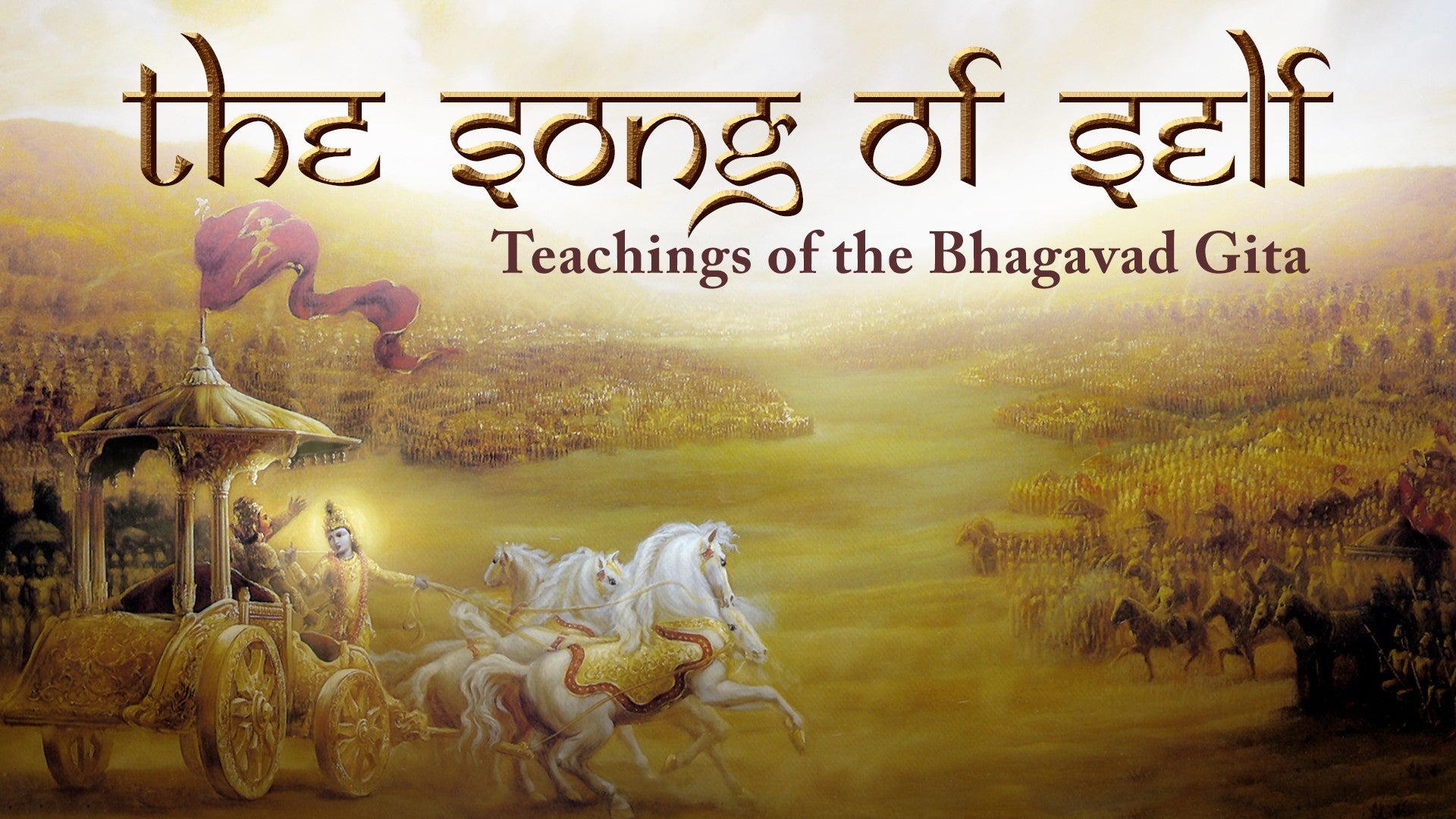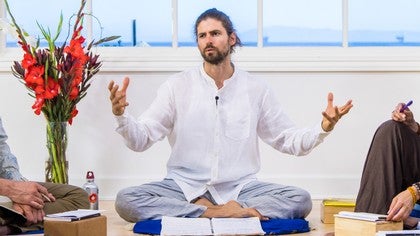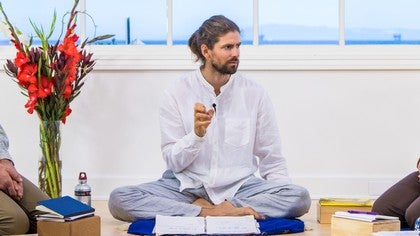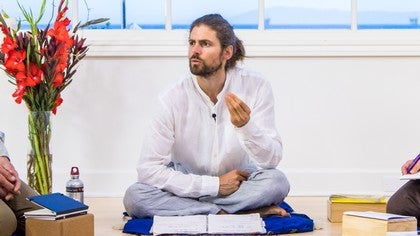Description
About This Video
Transcript
Read Full Transcript
So now we come to the 59th verse and we saw as we were exploring the previous verse that alluring sense enjoyment can sometimes lead us away from what is actually our deeper longing. And sometimes the senses, great powers though they are, can get us into difficulty. So Krishna is going to really start to develop this idea of how we can work skillfully with the senses. And in this verse he is going to introduce this idea of nirahare. Now nirahare basically means one who has left off consumption.
So it can be used to describe someone who is fasting or who is not eating. But it can also mean that they are not taking in through other senses as well. So this is the verse, krishna says, the last word of the first line, dehinaha, the embodied soul. This person who for a soul, a consciousness, an individual consciousness that is inhabiting a body, this body comes with the powers of the senses. This is part of the blessing of having a human body, that these senses are so powerful.
In the Indian system the senses are considered devata, meaning they have divine power. And they are tremendously powerful, yes? They allow us to experience so much, and sometimes they can pull us in different directions. So Krishna says, for the dehinaha, who has been practicing nirahara? So nirahara, for an embodied individual human being, who has been leading off consumption, who has been avoiding integrating, who has been avoiding interacting so much with the realm of sensory enjoyments, vishaya, the objects of the senses, rasa-vargam, except for the sense of taste, vini-vartante, it's like they turn away from that person.
Then he goes on, rasa-api asya-paran rishtva-ni-vartate, but he says, for somebody who sees para, the highest, the ultimate, even the sense of taste turns away, falls away, it loses its sway or its pull over such a person. So let's look at it in two parts for you. The first part, if you are in a body, but you don't kind of go towards sense enjoyment, you leave off consumption, there's the idea that the sense enjoyments, they kind of turn away from you. Is this true? You might have experienced in life sometimes you feel like, oh, I really want to watch a movie, I really want to look at a particular type of art, or I really want to see that vivid blue of a clear sky through some lush green trees.
You want to see, have a particular visual experience, or I'd really like to hear a particular type of music, or I'd like to feel the cool water on my skin if it's hot, or I'd like to feel warm water on my skin if it's cold. For example, we can have that longing for particular types of sense experience, however, if you haven't had any food for a much longer time than you're accustomed to not have food, are you thinking about the music you want to listen to? Are you thinking about, oh, yeah, I'd like to go to that gallery and look at that beautiful picture by Georges Seurat of the Poyntiist art? You don't start to have these desires, you're just thinking about, where can I get some food? And it's the idea that one could perhaps cultivate certain practices or approaches to life which would lessen the grip of sense allure over our individual consciousness.
So it's the idea that appetite grows by what it feeds on, yes? So if we get used to having a lot of rich sensory experiences, we want more. But if we take a more, let's say, modest or restricted approach, we can get very used to more simple, sensual experiences and come away from the desire for more elaborate or deeper, let's say, sensory experiences, if that makes sense. Now, sometimes in spiritual practices, people think, yeah, that's a great idea. I will deprive my senses and so I will train them.
I will train them with great discipline and rigor. And so, for example, you hear sometimes of people who, let's say they're in a cold climate, no hot showers for me, only in the cold shower, chocolate, forget about that. And they stop having certain things which could be seen as being not necessary or slightly decadent. And there's the idea that then you train your senses to enjoy simpler things. And this can work if you're really, really alert and skillful about what you're doing.
But it's also a hazardous path because sometimes we're not actually really weaning ourselves off the thing we need to become free from. So sometimes, for example, people can find that sexual energy is one that perturbs them. But if, for example, you're starving, you have less energy to be distracted in such things. So in the course of my teaching exploration in yoga, I met a couple of people one time, one year, and these two guys came along, and they basically both recognized they had a problem with their sexual appetite. And they both decided they had a very close friendship, and they decided we need to come out of this.
This is no good. And so they started living what we might refer to as a rather ascetic life. They started eating a very restricted diet. They started doing very intense physical exercise. So they had less energy to spare, let's say.
And so that previously troubling sexual appetite had no fuel. And for a while, they thought, oh, yeah, great. But then what happened? They were in a situation where they weren't so starving, and suddenly it flared right back up again. And so yoga reminds us, beware the valley of false enlightenment.
There's a nice story to illustrate this. There's a story that's set in South India. And it's a student who's a devotee of a great guru. And he knows that his guru became enlightened. This is the story that he believes.
His guru became enlightened in this particular cave in the forest, not so far from the city they live in, but in a rather secluded, hilly, forested area with lots of wild animals, kind of a dangerous place, where the sage, the guru, had found this cave where there were a few little roots he could feed on. And it was very isolated, lots of dangerous wild animals round about, so no humans went anywhere near this cave. And the devotee has been practicing. He's been practicing with great rigor, with great discipline. And the devotee feels that now it's my time.
I'm ready. I'm ready to go to the cave and get that final dose of full enlightenment. And so he has some leave coming up from work. He actually arranges for a sabbatical, three months. And so he goes to his guru and he says, Master, he falls at his feet, he says, Master, I am ready.
Please, turn the directions to the cave of enlightenment. And the master says, why do you want to go there? And the devotee says, but Master, it is my time now. I've been practicing diligently and I know now I am ready. I'm ready to make that leap, that next step.
And the master says, what about your job? He says, I already took three months off. Oh, OK, three months. You know, there's lots of wild animals. How about you come here and meet me every day for three months?
There's no master where we've done every other time I've taken leave. I know this time I have more time. I'm ready. I am resolved. I've had enough of the world and its fleeting pleasures.
I want to know the ultimate enlightenment. I'm ready. Please, please tell me how to get there. The master thinks you cannot tell anybody how to get there. You can only ever find it out for yourself.
Anyway, this fool, he needs to be taught in a way that he will actually get. So he tells the devotee how to get to the cave. First week. Well, that's not true. First he tries to dissuade him.
He says, you know, he's not really ready for this. He tells him about certain things in my experience. But then he says, OK, here's the directions. He arrives in his new home, the cave. And there are some sprouts that grow just in the grove nearby the cave.
This will be his diet. There is a pristine stream. This story happened a long, well, quite a long time ago before pollution in South India where this story is set was at such alarming levels. And so he has his water supply, he has a few sprouts to eat, and he settles in. And the rocky surface of the cave, at first his seat accustomed to his comfortable, urban meditation cushion, he feels a little bit uncomfortable, but he kind of likes that, makes him pay attention.
There's no chance of dozing off here. And in this first week, the first couple of days, he thinks, oh, yes, I knew I was ready. But then what happens? The city and all its allure just races and races and whirls and swirls through the sphere of his awareness. And he thinks, oh, no, my master was right.
I'm not ready for this. And he's racked with doubt. But he thinks, hmm, early days, let me sit it out, I'm sure it will pass. And with great courage and great discipline, he sees his way through this first terrible trial as his mind is just tormenting him. And he comes face to face with the mania that was always hidden inside.
But after about a week or so, after several days of real mental torture as he confronts the craziness of his own mind, a magical few hours arise. His mind is still, his mind is clear, and he sees or feels like he experiences a great light, a great solidity, and a great buoyancy. And he feels, oh, yes, I knew I was ready. And he gives internally praise and gratitude to his master. Oh, I knew, yeah, thank you for letting me come here.
And this persists, and he gets into a lovely little rhythm. Go to the stream, go for a little walk. He's walking so mindfully. Every step he's rejoicing in the miracle of awareness and consciousness. The stream water just tastes like ambrosial nectar, I was about to say champagne, but I don't think the South Indian guy would actually drink champagne.
It tastes just divine to him. And those sprouts, he's eating them with such relish and such depth of awareness that one sprout seems to hold so much nutrition. It's like he can see, you know, they say to see the world in a grain of sand, in infinity in an hour. It's like this sprout is the whole food pyramid wrapped up in a little blessing from nature. And he puts it in his mouth, and he feels, yes, this is making me superhuman.
And he has a final time, meditating in bliss. But after a few days of bliss, he thinks, yeah, I've got to go and show my master now that I was really ready. And he makes his way back to town. Now his master lives near the South Indian city of Chennai, so he may have been to Chennai, also known as Madras. He's quite a big city.
But the master lives in the outskirts, and the devotee lives a little bit closer to town. The devotee thinks, yeah, I'll just go right to master on the way home, and say, rose up, or rather glides up, elegantly, gracefully, because now he's an enlightened master, barely denting the ground with his gentle footsteps. Not feeding a swell of pride, even though he's pretending not to. He bows down at his master's feet and says, oh, master, thank you. Thank you.
How can I repay you? I knew I was ready. Thank you so much for telling me how to get to the cave of enlightenment. And the master says, hmm, hmm. So, are you happy you went?
Can you not see master? He says, I don't feel like seeing today, it's Tuesday. Come and see me on Thursday. Thursday is the day of the guru, traditionally, in India. And the disciple thinks, oh, yes, of course, master doesn't like to receive people on Tuesday.
That's one of the days he likes to stay quiet. Oh, sorry, master, yeah, I'll come back on Thursday. Anyway, it so happens this particular Tuesday is a festival day. Now, if you've spent any time in South India, you'll know that it's not that unusual for it to be a festival. There are many festivals.
But what happens when there's a festival in town? Festivities. So he's walking towards his home. All those days, you know, he was seeing the little sprout as all of nature's bounty wrapped up in one little shoot. But now, oh, he can smell some people frying those delicious fritters by the side of the road.
There's that fresh corn. And where is he? He can smell the corn. He wants it. He wants the corn.
And he tries to follow his nose. But in trying to follow his nose, he sees a parade, there's a big parade in the festival. And people are beating the drum, and it's a very inviting rhythm. And then he sees the parade, and there are young people doing like, you know, tumbling and acrobatics. And wow.
And he looks to, he's forgotten about the corn now. And he looks, he's following the parade. And then he sees three women in the most beautiful bright saris, and the bright flash of the silk catches attention, and he's forgotten the tumblers. And then he notices that the women wearing the saris are really rather alluring. And then he's looking at them, and they pass out of his field of vision.
And then somebody walks by with some freshly cut pineapple, and oh. And then suddenly, he notices what's happening. And his mind is still whirling. What has happened to the serenity he experienced in the cave of enlightenment? And then he realizes, oh, my master, he's been playing with me.
And he realizes, I'm not enlightened, I just got adapted to my surroundings in the cave. And this is the idea, that we'll know when we're enlightened, and I'm not saying this from personal experience. But we'll know when we're enlightened, and we can go into the darkest, most troubling place imaginable, and still feel steady. And so here, in the 59th verse, Krishna says, you can turn away from the things that might trouble you. You can turn away from the type of sense objects that could kind of poison you and beguile you, and confuse you.
But you'll only really know, Krishna will talk about this more in a few verses time, you'll only really know that you've mastered your senses when you can walk through the field of all sense experience without being perturbed. So it's one thing to deprive one's senses. This can sometimes function as a short-term remedial measure. If you've been overindulgent, then certainly, cultivating some moderation, so you start to understand what is really a healthy appetite for you, and what is a destabilizing appetite. Some moderation, as you navigate and learn that, can be very, very helpful.
It can be a very appropriate short-term mechanism or learning tool. But in the longer term, a much more reliable and faithful, you might say, or dependable method is if we actually give our senses the experience of turning back to their source. Because when we let our sensory experience remind us of that fullness inside, then it's like we will refine the senses, we will habituate them to subtler, deeper experiences, so they won't be so subject to being beguiled by these transient things that don't really nourish us. So if we use our senses to relish and experience that beautiful satisfaction, that deep sense of fullfulness that comes when we draw everything into the center, when we practice true pratyahara and take all our experiences back to the animating, enabling consciousness, then the senses will cease to have that, or will have much less of a troubling influence on us. And so Krishna says in the second part of this verse, rasa ha api, even the sense of taste will turn away from the one who has seen the highest.
So it's the idea, if we use our senses to turn towards the highest, to turn towards the subtlest, to turn towards the animating essence and consciousness, then even the sense of taste will loosen its grip on us. So of course as human beings, we're biologically programmed to survive, and so to seek food when we need it. But the idea is once we become so established in awareness of our undying essence, the anxiety about staying alive subsides. It doesn't mean that we're no longer in tune with our instincts, but it means we won't be so fretful if we can't meet our immediate needs. So Krishna says, yes, certainly, you can turn away from the senses, and then the objects of the sense will hold less allure for you.
If you train yourself to be moderate, you will learn to enjoy moderation, because true moderation is healthy, it nourishes you, you find real sustainable enjoyment in that moderate approach is the idea in yoga. We actually say in yoga, it's your duty to enjoy yourself, because when you really enjoy, you will learn to relax into the things that you do have. But the idea, by doing that, then you'll come more to that place where none of the senses can beguile you, and he's going to develop this further now in the coming verses.
The Song of Self: Bhagavad Gita: Chapter 2
Comments

You need to be a subscriber to post a comment.
Please Log In or Create an Account to start your free trial.








